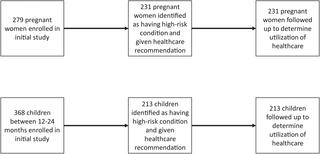PLOS ONE ( IF 2.9 ) Pub Date : 2018-06-21 , DOI: 10.1371/journal.pone.0199607 Abram L. Wagner , Lu Xia , Aparna Ghosh , Sandip Datta , Priyamvada Pandey , Sujay Santra , Sharmila Chattopadhyay , Uddip Nandi , Tanusree Mazumder , Sucheta Joshi , Joyojeet Pal , Bhramar Mukherjee

|
Background
Community health workers (CHWs) have been placed in many rural areas in India to increase villagers’ connections to basic preventive health care. In this study, we describe how pregnant women and mothers of young children react when CHWs inform them that they, or their child, are at high risk of pregnancy-related complications or early childhood developmental delays, and further screening and health care from a physician is recommended.
Methods
In this longitudinal study in rural villages in West Bengal, India, pregnant mothers, as well as mothers of children aged 12–24 months, were screened for high risk complications. They were re-contacted and asked questions regarding how and to what extent did visits by the CHWs improve their household’s overall health behavior, along with details about what additional care, if any, they sought. These responses are presented by different demographic and medical characteristics.
Results
Of the 231 pregnant women, all said they had sought additional care in response to the CHW visit, and all stated that feedback from the CHW resulted in improvement to their health behaviors. Most (90%) pregnant women gave birth at an institution. Among the 213 mothers of young children who were followed up, all sought additional care in response to the CHW’s visit. Most (67%) mentioned that they had a significant improvement in their health behaviors following feedback from the CHW, and the rest stated that they had some improvement.
Conclusions
With the proper training, CHWs can be partners in health care to improve the health of vulnerable populations, not only in rural areas of India, but also in other developing countries. CHWs can promote positive health outcomes in their villages of residence.











































 京公网安备 11010802027423号
京公网安备 11010802027423号